| |
Home
Famous and Fascinating Women in History
Frontiersmen and Women
The World's Greatest Composers
Famous Women Spies
Great Authors of the World
Generals and other Noteworthy People
from the Civil War
The Presidents of the United States
The First Ladies of the United States
Homes and Monuments of and to
Famous People
Historical People and Events by Month for Each Day of the Year!
Famous Figures in Black History
The Calvert Family and the Lords Baltimore
Understanding the American Revolution and its People
Everything Beatles!
Everything Maryland! |
| |
|
 
|
| |  |  |
 |  | 
The
Homes and Presidency of Andrew Johnson
By
John T. Marck
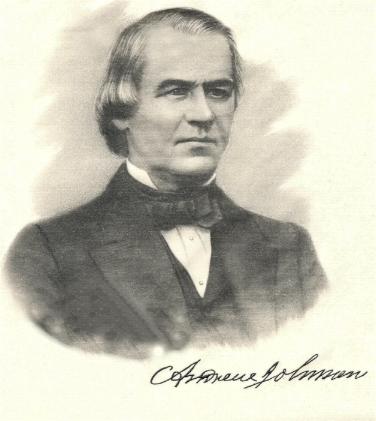
Andrew Johnson was born in the
kitchen loft of a log cabin on December 29, 1808 in Raleigh, North
Carolina to almost illiterate parents. Jacob Johnson, his
father, barely made a living working as a hotel porter and bank
janitor. When Andrew was three-years-old, his father died tragically
trying to save two of his wealthy employers from drowning. His mother,
now widowed, worked as a weaver and a spinner to feed Andrew and his
older brother William. When Andrew was still a youngster, his mother
married Turner Daugherty, but this addition to the family did not
improve the family finances.
At the age of 14, Andrew and his
brother were apprenticed to a local tailor where they worked for
several years before running away. Being on the run for two
years, with a reward on their heads, Andrew returned to Raleigh in
1826 where he reunited with his mother and stepfather before moving
west in a one-horse cart to Greenville, Tennessee. Here he opened a
tailor shop, and married Eliza McCardle. Andrew soon gained
respect and popularity in the community, leading to elected offices,
including the governor of Tennessee and U.S. Senator.
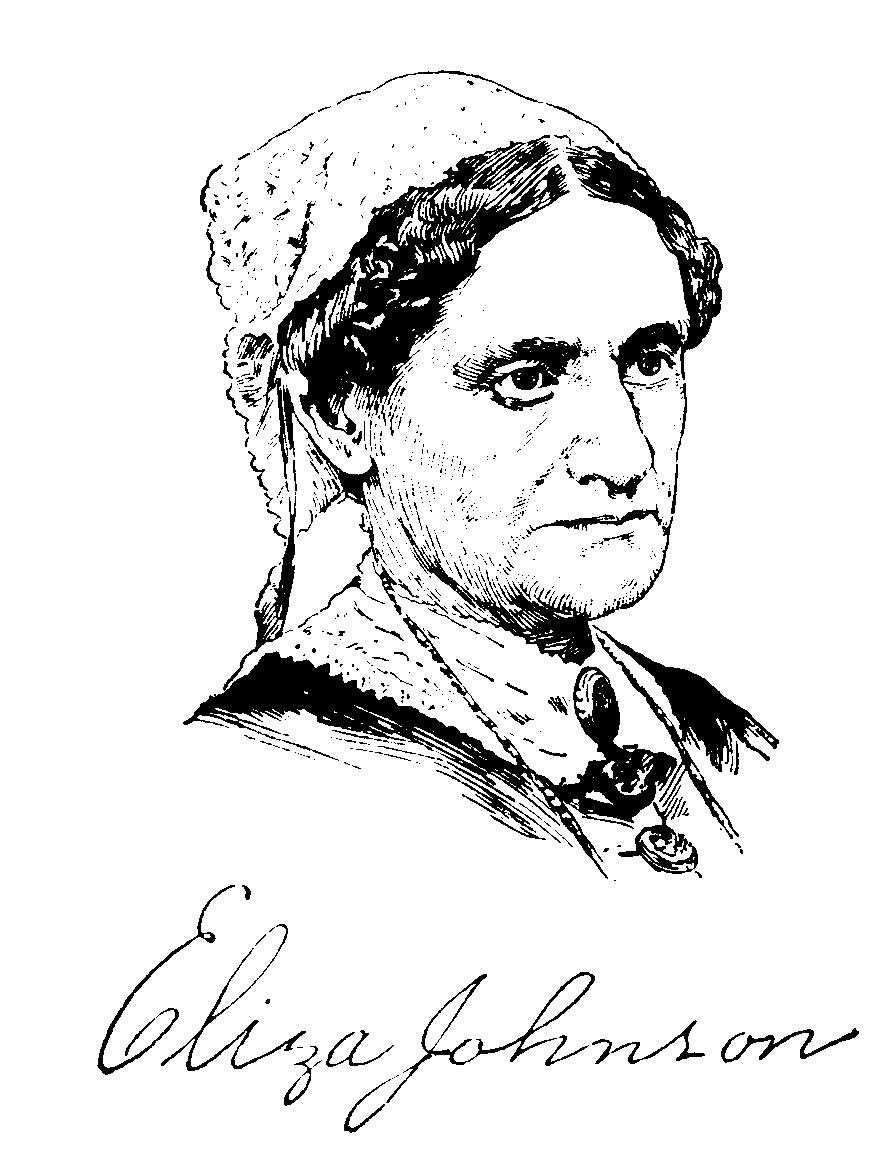
Andrew's
birthplace in Raleigh is located at the Mordecai Historical Park.
At the time of his birth, this small dwelling served as a kitchen and
residence behind Casso's
Inn. This building, built in the late 1700s, was part of a
complex of buildings at Casso's,
a well-known hotel of the period. This inn is where Andrew's
stepfather worked as a stable keeper, and his mother as a weaver.
Tradition tells us that Andrew was born in the loft of the kitchen at
the Inn. On December 29, 1808, the tradition continues, that a
wedding party was being held at the tavern when it was interrupted by
the news of the birth of baby. It is said that the bride went to
the cabin area at the back of the Inn to visit with the newborn Andrew
and his mother.
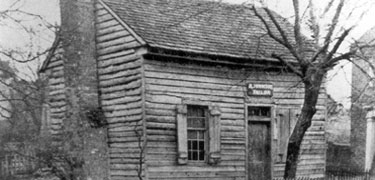

In Greenville, Tennessee there is a
replica of Johnson's
birthplace, that represents an important part of Johnson's
story, in that it speaks of a man who began his life in poverty, who
later became the seventeenth President of the United States.
Early in his political career in
Greenville, Johnson became a skilled speaker, supporting the common
man and maligning the plantation society. When serving as a
member of the House of Representatives and the Senate in the 1840s and
1850s, he advocated a homestead bill to provide a free farm for every
poor man.
When the secession crisis hit,
Johnson remained in the Senate even though Tennessee seceded, making
him a hero in the North, and a traitor in the eyes of the South.
In 1862, President Lincoln appointed him Military Governor of
Tennessee. In 1864, the Republicans, nominated Johnson, a Southerner
and a Democrat, for Vice President.
Johnson's
Early Home in Greenville
During the 1830s, Johnson and his
family moved to his residence, where they stayed until 1851. It was
during these years that his life changed drastically, moving from the
tailor trade to politics. Johnson rose quickly, beginning as an
elected alderman in Greenville, to its mayor. From here he
became state representative, state senator, and U.S. representative.
In 1853 he was elected governor of Tennessee and was sent to the
United States Senate in 1857.
The
Johnson Homestead in Greenville
In September 1851, when
still a congressman; Andrew purchased this house, which would be his
last, and its half-acre lot, from James Brannan.
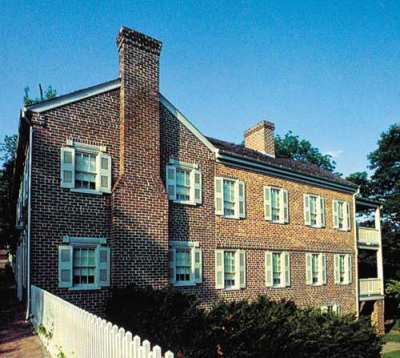
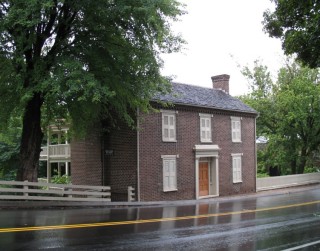
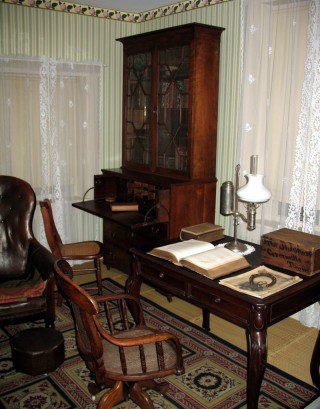
Andrew's Bedroom
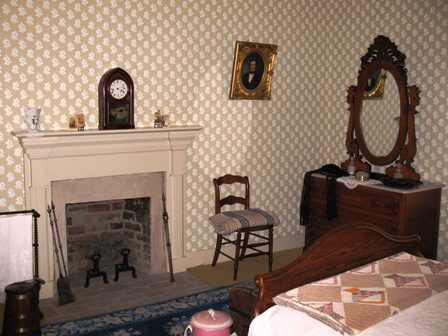
Wife's Bedroom

Dining Room
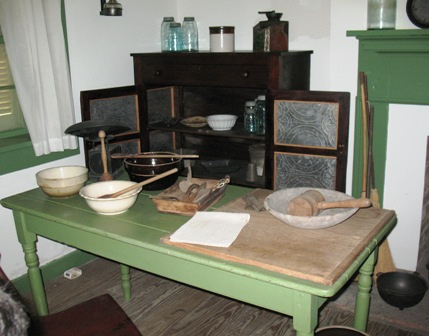
Kitchen
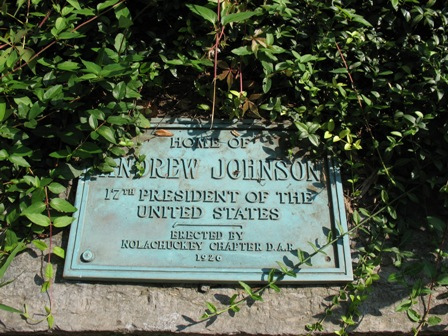
The house was built directly on the
street in Northern Irish fashion, consisting of a two-story front and
a one-story ell (the wings of the building at right angles to the main
structure). In 1868 to 1869, the second story was added to the ell, in
preparation of the retiring President's
return to Greenville. While the house has characteristics of the
Fashionable Greek revival period, it also reflects the older Federal
style architecture, which was popular in the 1840s. The facade
of the "Homestead"
shows a strict symmetry of traditional Federal design, and the simple
window frames are adorned with louvered shutters. Framed by
pilasters, which support a flat entablature, the Greek revival doorway
is bordered by small sidelights. Other Greek characteristics include
the brick cornice, with dentils, and the transom.
The house was restored in 1956 and
today, the Homestead appears as it did during the last years of Andrew
Johnson's
life.
The Presidency
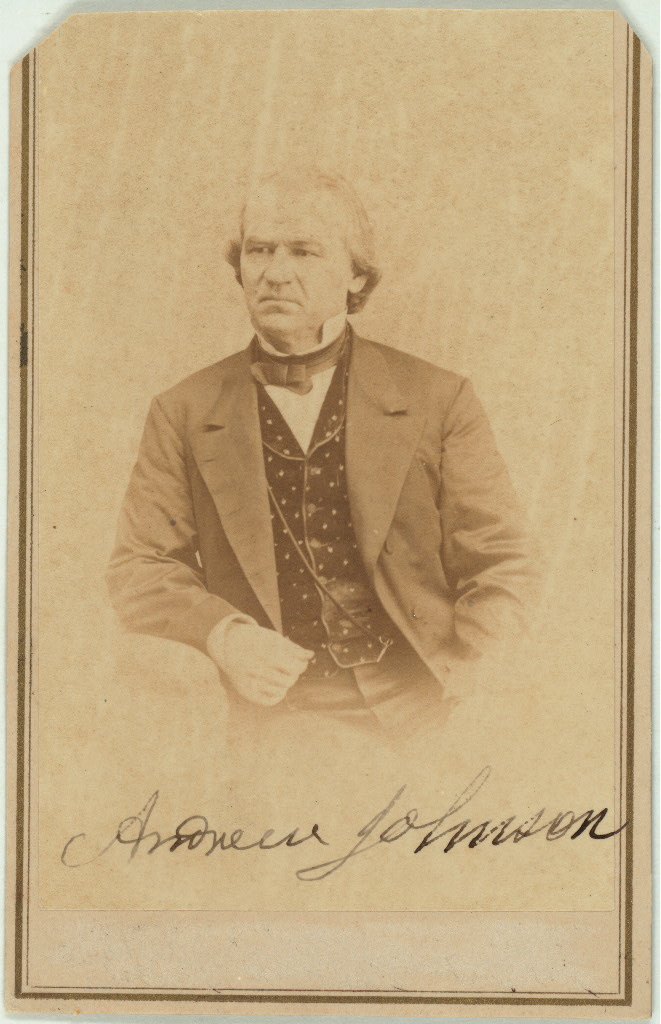
Following Lincoln's
death, the Presidency fell upon the old-fashioned Jacksonian Democrat
of states'
rights views. An honorable man, Johnson was one of the most
unfortunate of Presidents. Lined against him were the Radical
Republicans in Congress, who were ruthless in their tactics, and
Johnson was no match for them.
One of Johnson's
first orders of business was to reconstruct the former Confederate
States while Congress was not in session in 1865. He pardoned
all those who were willing to take the oath of allegiance, but
required the leaders and those men of wealth to obtain special
Presidential pardons. When Congress met in December 1865, most of the
southern states were reconstructed, slavery was being abolished,
however; "black
codes,"
to regulate the freedmen were starting to appear.
The Radical Republicans in Congress
began their move to change Johnson's
program. They gained support of Northerners who were shocked to
see Southerners maintaining many of the prewar leaders who imposed
many of the prewar restrictions upon Negroes. Their first
measure was to refuse to seat any Senator or Representative from the
old Confederacy, followed by their passing procedures that dealt with
former slaves. Johnson quickly vetoed this legislation. The Radicals
in turn, for the first time in history, gathered enough votes to
overturn the President's
veto. The bill passed, known as the Civil Rights Act of 1866, which
established Negroes as American citizens and forbade discrimination
against them. Several months later, Congress passed the Fourteenth
Amendment, which specified that no state shall
"deprive
any person of life, liberty, or property, without due process of law."
All the former Confederate states,
except Tennessee, ratified the amendment, and two bloody race riots
began in the South. When Johnson went to speak in the Middle West of
the country, he faced very hostile audiences.
By March 1867, the Radicals had
their own plan for Reconstruction, which placed southern states under
military rule, and passed laws that restricted the President.
When Johnson supposedly violated one of these
"laws,"
the Tenure of Office Act, by dismissing Secretary of War Edwin M.
Stanton, the House voted eleven articles of impeachment against him.
Tried by the Senate in the spring of 1868, he was acquitted by one
vote.
Late in the administration of
Andrew Johnson, General Ulysses S. Grant argued with the President and
aligned himself with the Radical Republicans. He was, as the symbol of
Union victory during the Civil War, their logical candidate for
President in 1868, who won election as the eighteenth President of the
United States.
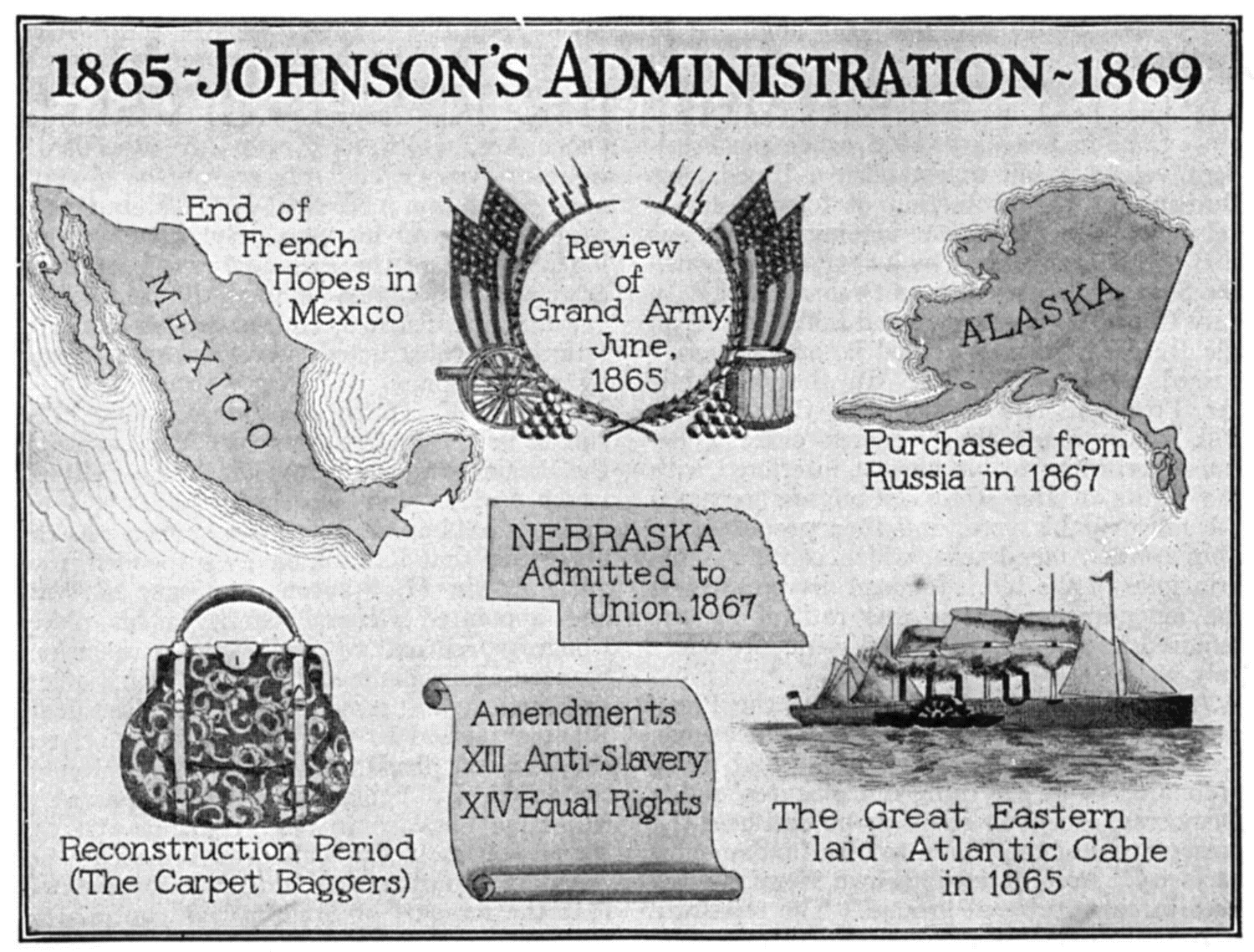
After Johnson's
Presidency, the people of Tennessee returned Johnson to the Senate in
1875. He was the only man to serve as Senator after being
President. A few months later, on July 31, Andrew Johnson died at the
age of 66 of a stroke in Carter County, Tennessee.
Johnson is buried at the Andrew
Johnson National Cemetery, in Greenville, Tennessee. He lies beneath
the turf of a steep area known as Sackett's
Hill. His body is wrapped in the American flag with a copy of the
Constitution resting beneath his head. His wife Eliza died
the following year on January 15, 1876 and is buried beside him.
The family erected an impressive eagle-topped monument in 1878.
The President's
burial site was designated a National Cemetery in 1906, whereby the
war Department maintained it until 1942. The management was then
transferred to the National Park Service becoming the Andrew Johnson
National Historic Site.
Quick
Biographical Facts
Andrew Johnson
17th President
Term- April 15, 1865 to March 4,
1869
Democratic Party
Birth: Raleigh, North Carolina,
December 29, 1808.
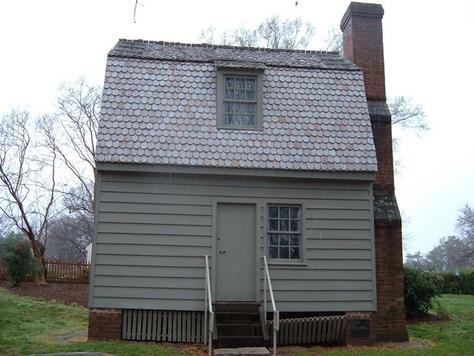
Ancestry: Scotch-Irish and English
Marriage: Greenville, Tennessee,
May 5, 1827 to Eliza McCardle, who was born in Leesburg, Tennessee,
October 4, 1810. Eliza died in Greene County, Tennessee, January 15,
1876 and is buried at Andrew Johnson National Cemetery, Greenville,
Tennessee
Children: Martha (1828-1901);
Charles (1830-1863); Mary (1832-1883); Robert (1834-1869); Andrew
(1852-1879)
Final Home: The Homestead,
Greenville, Tennessee
Education: Self-taught
Religion: No specific denomination,
however admired the Baptist principles of church government
Occupation before Presidency:
Tailor, legislator.
Pre-Presidential Offices: Alderman;
Mayor; Member of Tennessee Legislature; Member of U.S. House of
Representatives and U.S. Senate; Governor of Tennessee; Vice President
Age at Inauguration: 56
Johnson Administration: Vice
President: None, Inauguration April 15, 1865, Kirkwood House,
Washington, D.C.
Occupation after Presidency:
Senator
Death: Carter County, Tennessee,
July 31, 1875
Cause of Death: Stroke at age 66
Place of Burial: Andrew Johnson
National Cemetery, Greenville, Tennessee
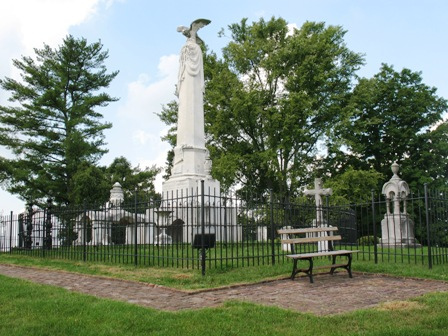
Interesting Facts:
Johnson
was the third Vice President who succeeded to the Presidency because
of the death of his predecessor, Abraham Lincoln
Johnson
was the only President to serve as a U.S. Senator after being
President. He was elected to the Senate in 1875
Johnson
was the first President of the United States to be impeached. The
Senate tried him for "High crimes and misdemeanors", however he won
his case by a single vote
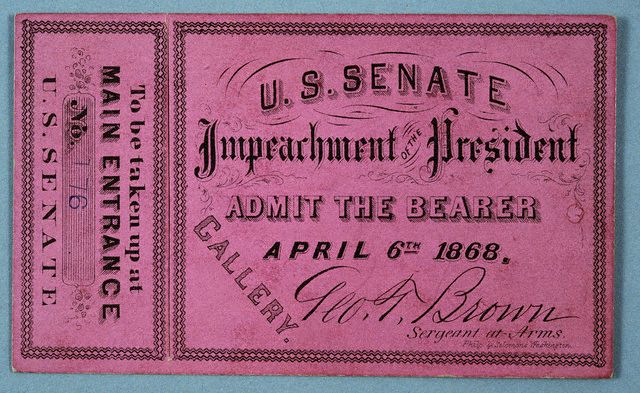
This one vote was cast by
Republican Senator Edmund G. Ross from Kansas
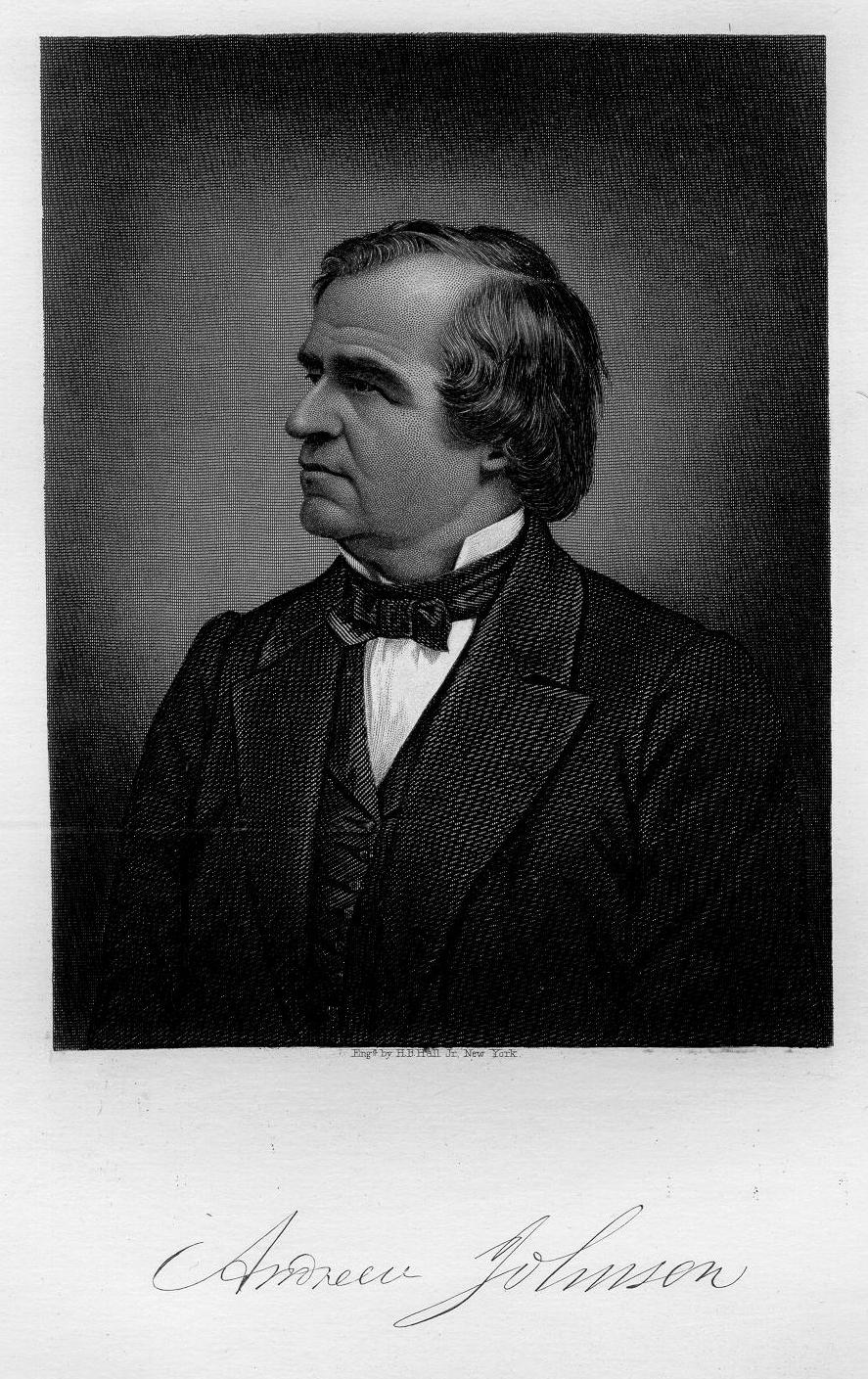
Copyright © 1992-2022 by John T. Marck.
Grateful appreciation and informational assistance from the Mordecai
Historical Park, Raleigh, North Carolina; The Homestead, Greenville,
Tennessee, and The Andrew Johnson National Historic Site, Greenville,
Tennessee. Information in part from the White House Historical
association, and The Presidents of the United States of America
written by Frank Freidel and Hugh S. Sidey (contributing author), and
The Presidents of the United States, by John T. Marck.
A
Splendid Time Is Guaranteed For All
| | |
|
|
|

